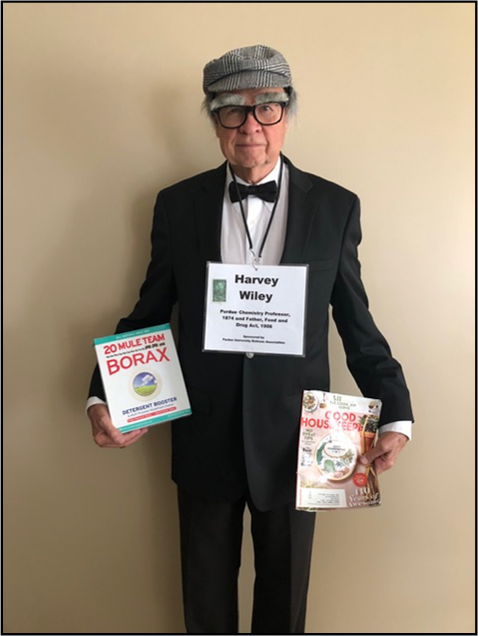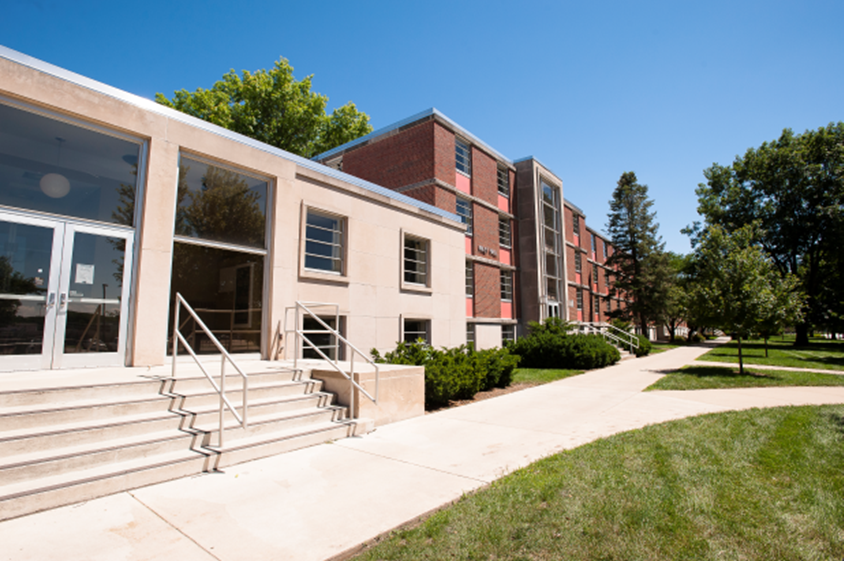Dr. Harvey Washington Wiley (1844-1930)
 To help celebrate Purdue University’s 150th anniversary in 2019, the Purdue University Retirees Association (PURA) recruited some of its members to portray historic characters from Purdue’s past.
To help celebrate Purdue University’s 150th anniversary in 2019, the Purdue University Retirees Association (PURA) recruited some of its members to portray historic characters from Purdue’s past.
The reenactors researched their characters, developed costumes and personas, then appeared at a number of public events sharing the stories of these important Purdue figures with the public.
Scott Rumble, pictured here, portrayed Dr. Harvey Washington Wiley.
*****
Harvey Washington Wiley was born on October 18, 1844, near Kent, in Jefferson County, Indiana. His father was a farmer and his mother helped with the home and the farm. He studied for about a year at Hanover College, which was close to his home, and near Madison, Indiana. In 1863 he enlisted with Company 1 of the 137 Regiment Indiana Volunteers during the Civil War.
He later returned to Hanover, majored in the humanities, and excelled as a graduate receiving his A.M. there in 1870. He also studied at th Indiana Medical College and received his M.D. in 1871. He served as a professor of Greek and Latin at Butler College in Indianapolis, from 1866 to 1870.
After graduation, Wiley taught Chemistry at the IU Medical College, teaching Indiana’s first laboratory course in chemistry in 1873. He was briefly at Harvard where he received a B.S. degree and then accepted a faculty position in chemistry at Purdue University in 1874, which was a newly established University. He also was appointed the first state chemist of Indiana.
Wiley, traveling to Germany, attended the lectures of August Wilhelm Von Hofmann who discovered several organic tar derivatives. He spent time with the Imperial Food Laboratory in Bismarck working with Eugene Sell, learning how to use the polariscope, and studying sugar chemistry.
When he arrived back to Purdue, the Indiana State Board of Health asked him to study sugars and syrups on retail sale to see if they had any adulteration. The last part of his time at Purdue involved studying culture and sugar chemistry, hoping to develop a strong domestic sugar industry along with teaching. He published a paper in 1881 discussing the adulteration of sugar with glucose.
In 1883, Dr. Harvey Washington Wiley was named chief chemist of the United State Department of Agriculture. He investigated food and drink fraud, even conducting some surprising tests on groups of young men who became known as the Poison Squad. He found good friends and support in Upton Sinclair, Fannie Farmer, and Henry J. Heinz. Heinz actively advocated for pure food.
Dr. Wiley impacted the world and changed history. Dr. Wiley’s Law, the 1906 Pure Food and Drug Act, was a legacy for him. He had many accomplishments in Washington that improved food safety. He also had many battles to get Washington to see what he was advocating.
Wiley resigned from government work in 1912 and took over Good Housekeeping and their laboratories. He is known for the Good Housekeeping Seal of Approval. He continued his work on behalf of consumers. He was concerned about the amount of caffeine and other drugs in popular drinks, including Coca Cola. He remained at Good Housekeeping for 18 years.
Harvey Wiley died at home in Washington D.C. on June 30, 1930, the 24th anniversary of the signing of the Pure Food and Drug Law. He and his wife, Anna Kelton Wiley (1877-1964) whom he married in 1911, are buried at Arlington National Cemetery.
Harvey Wiley leaves quite a legacy. The Liberty ship S.S. Harvey W. Wiley was launched in 1943. The U.S. Post Office issued a 3-cent stamp in his honor on June 27, 1956. The Harvey W. Wiley Award is AOAC international’s most prestigious scientific award, established in 1956 and presented annually. Wiley Hall at Purdue University is named in his behalf. He was honored by Hanover College, and he has a historic marker at his birthplace in Kent, Indiana. The FDA’s Center for Food Safety and Applied Nutrition is located in the Harvey W. Wiley Federal Building in College Park, MD, constructed in 2001 and named after Wiley in 2002.

Wiley Residence Hall, opened in 1958, is named after Dr. Wiley
Photo (left) courtesy of Purdue Marketing and Media
The French government named him a Chevalier of the Order of the L’egion d’honneur in 1909. An honor established through the Chemistry Department at Purdue University is the Harvey Washington Wiley Distinguished Professor award. Dr. Dale W. Margerum was awarded this recognition in 1997.
Dr. Wiley’s home at Somerset, Maryland, built in 1893, was listed on the National Historic Register in 2000.
An excellent book written about Dr. Wiley by Deborah Blum would be worthwhile reading. It is entitled The Poison Squad. There are many stories about Dr. Wiley. He was quite a character. He definitely helped provide food safety for all.
Return to PURA Historical Character Project Page
